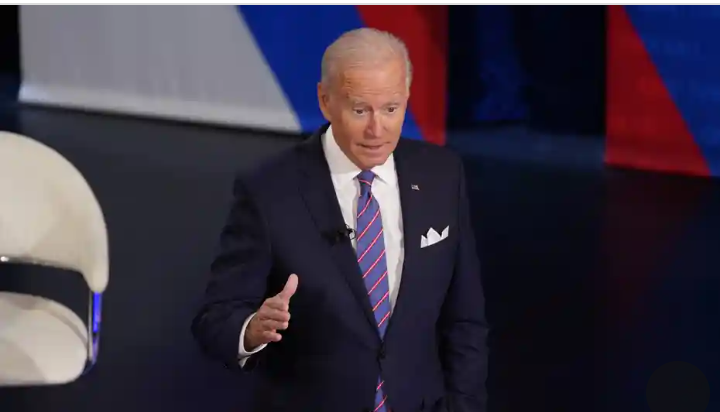President Joe Biden has said the US would come to Taiwan’s defence and had a commitment to defend the island China claims as its own, forcing the White House to clarify for the second time in three months that US policy on the subject has not changed.
“Yes, we have a commitment to do that,” Biden said at a CNN town hall on Thursday night when asked if the US would come to the defence of Taiwan, which has complained of mounting military and political pressure from Beijing to accept Chinese sovereignty.
The president made a similar pledge in August during an ABC interview, insisting that the US would always defend key allies, including Taiwan, despite the withdrawal from Afghanistan. Biden said then the US made a “sacred commitment” to defend Nato allies in Canada and Europe and it was the “same with Japan, same with South Korea, same with Taiwan”.
The White House subsequently told reporters that US policy on Taiwan had not changed.
After Thursday’s town hall, a White House spokesperson said Biden was not announcing any change in US policy. “The US defence relationship with Taiwan is guided by the Taiwan Relations Act. We will uphold our commitment under the act, we will continue to support Taiwan’s self-defence, and we will continue to oppose any unilateral changes to the status quo,” the spokesperson said.Advertisement
Biden said people should not worry about Washington’s military strength because “China, Russia and the rest of the world knows we’re the most powerful military in the history of the world”.
“What you do have to worry about is whether or not they’re going to engage in activities that would put them in a position where they may make a serious mistake,” he said.
Military tensions between Taiwan and China were at their worst in more than 40 years, Taiwan’s defence minister, Chiu Kuo-cheng, said this month. China would be capable of mounting a “full-scale” invasion by 2025, he added.
China claims Taiwan as its own territory, which should be taken by force if necessary, while Taiwan says it is an independent country and will defend its freedoms and democracy.
Washington is required by law to provide Taiwan with the means to defend itself, but it has long followed a policy of “strategic ambiguity” on whether it would intervene militarily to protect Taiwan in the event of a Chinese attack.
In August, a Biden administration official said US policy on Taiwan had not changed after the president appeared to suggest the US would defend the island if it were attacked.Advertisement
Biden said on Thursday: “I don’t want a cold war with China. I just want China to understand that we’re not going to step back, that we’re not going to change any of our views.”
China says Taiwan is the most sensitive and important issue in its ties with the US and has denounced what it calls “collusion” between Washington and Taipei. Speaking to reporters earlier on Thursday, China’s United Nations ambassador, Zhang Jun, said the country was pursuing “peaceful reunification” with Taiwan and responding to “separatist attempts” by its ruling Democratic Progressive Party.
“We are not the troublemaker,” he said. “On the contrary, some countries – the US in particular – is taking dangerous actions, leading the situation in Taiwan Strait into a dangerous direction … Dragging Taiwan into a war definitely is in nobody’s interest.”
With Reuters
… we have a small favour to ask. Millions are turning to the Guardian for open, independent, quality news every day, and readers in 180 countries around the world now support us financially.
We believe everyone deserves access to information that’s grounded in science and truth, and analysis rooted in authority and integrity. That’s why we made a different choice: to keep our reporting open for all readers, regardless of where they live or what they can afford to pay. This means more people can be better informed, united, and inspired to take meaningful action.
In these perilous times, a truth-seeking global news organisation like the Guardian is essential. We have no shareholders or billionaire owner, meaning our journalism is free from commercial and political influence – this makes us different. When it’s never been more important, our independence allows us to fearlessly investigate, challenge and expose those in power.
Source: The Guardian
